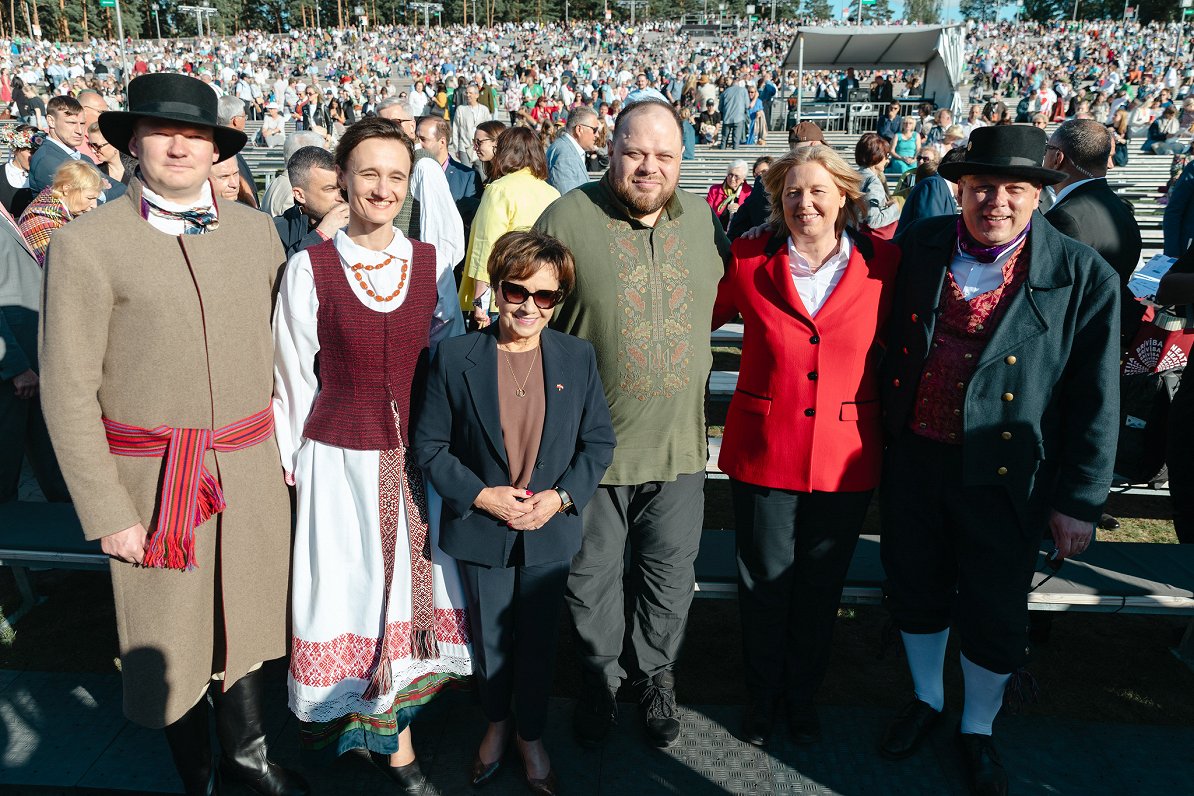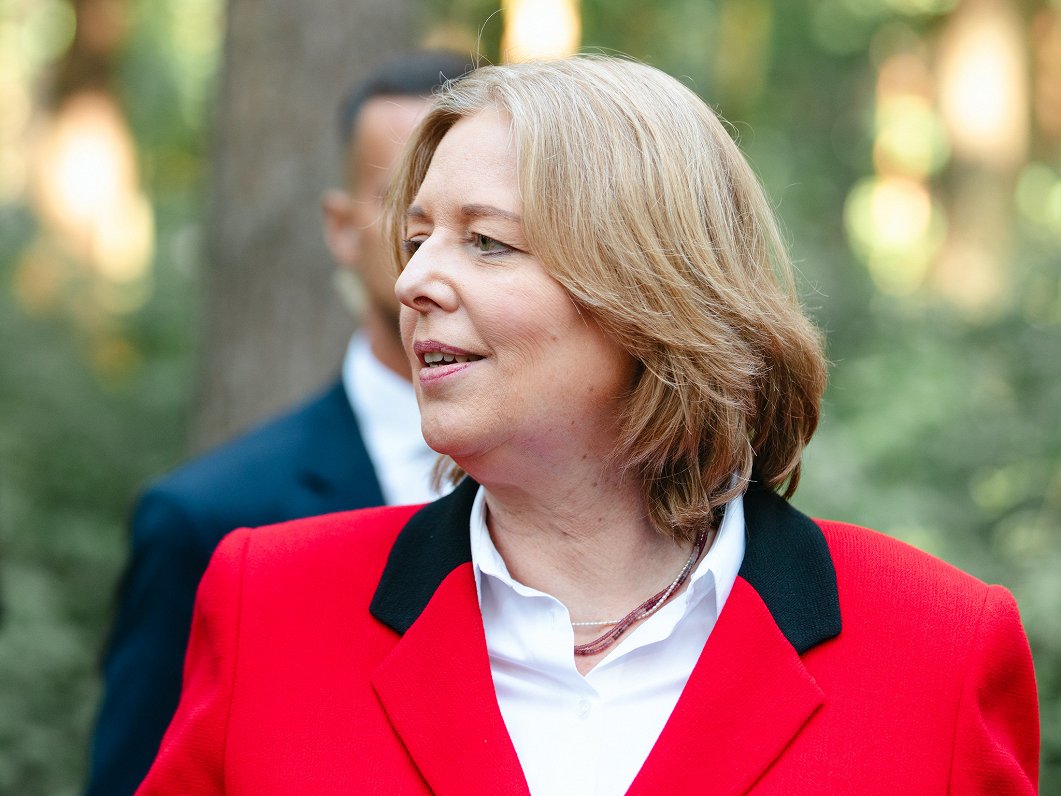Thousands of people gathered in Rīga for the ultimate highlight of the Latvian Song and Dance Festival: The Grand Finale Concert "Upward Together", dedicated to the 150th anniversary of the Song Festival tradition. Among the audience attending the concert "Upward Together" were also foreign dignitaries such as the President of the German Bundestag, Bärbel Bas, who was delighted to be able to enjoy the program.
"I'm looking forward to it," the German politician told LSM in Riga ahead of the concert. Experiencing the culmination of the XXVII Nationwide Latvian Song and XVII Dance Festival at the invitation of her Latvian counterpart Edvards Smiltēns was "an appreciation for Latvian culture". The song festival is "something very special" and has a special meaning for Latvians in times of war in Ukraine for their own identity, according to Bas.
Tens of thousands of Latvians dressed in colourful traditional costumes were coming together for the final concert on a big open-air stage in Riga's leafy residential district Mežaparks, singing in a giant choir folk songs handed down from generation to generation. More than 20,000 participants and a good 40,000 spectators attended the closing event of the traditional festival, which takes place every five years and was broadcast live on television. The interest was enormous – tickets were hard to come by.
'Something very special'
This year marked the 150th anniversary of the Song Festival that has become a cornerstone of Latvian nationhood and the ultimate celebration of Latvian culture and identity. It was through songs the small Baltic nation became independent more than 100 years ago, and it was through songs that Latvia regained its independence from the Soviet Union. Connecting the country’s past with its present and aiming at leading it into the future, the Song and Dance festival in times of constant change provides an anchor that reminds Latvians of who they are, according to the organizers.

The tradition of holding Song and Dance Celebrations was launched in 1873 when Latvians gathered for the first song festival in the Russian Empire – 45 years before Latvia was on any world map. Its origins and roots can be traced back to massed singing events in Germany, Switzerland, and Austria in the first half of the 19th century, that were picked up also by Baltic Germans living in what is now Latvia for centuries. In Germany itself, however, the tradition of mass singing events has not carried on as it has in Latvia for 150 years
"The President of the Latvian Parliament really raved about it during our last meeting and then invited me. So I couldn't help but agree to come and attend it", Bas told LSM with a smile at the sidelines of her two-day visit to Latvia, adding that: "Everyone I told in Germany that I was going to the Song festival and who knew it all had sparkling eyes. So, you really notice and realize that this is something very special.“
Talking Ukraine
The Bundestag President was visiting Rīga not only for celebrating the Song Festival, but also held political talks with the parliament speakers of the Baltic states, Poland and Ukraine on regional security and support to Ukraine on its path to membership in NATO and EU.
"We are of the opinion that after the war there must be a serious perspective for Ukraine to join NATO“, Bas said, adding that a clear path towards that goal must be indicated for this at the NATO summit in Vilnius. This call was also set out in a joint statement issued by the six parliamentary speakers at the conclusion of their discussions.
Together with her counterparts, Germany’s second-highest official paid a visit to Latvia's new President, Edgars Rinkēvičs. "I'm very excited about this meeting and getting to know him right on his second day in office. During my recent visit in June, I had a meeting with his predecessor Egils Levits, who is known to be a true friend of Germany and knows our country very well“, Bas told LSM, adding that she wishes for "the cooperation on the parliamentary side and between our states will continue in a positive way.“
Referring to Rinkēvičs’ inaugural speech at a special meeting of the Saeima on 8 July at which he took his oath of office, Bas underlined that she has no doubt the German-Latvian friendship will further continue to grow and thrive in the future. “From my side, I will everything I can to develop this cooperation in a positive direction – together with the parliament and my Latvian colleague, " the third female Bundestag President since 1949 promised.
Solidarity and self-criticism
The two-day visit was Bas' second appearance in Riga within a short period. The Bundestag President was previously in town for political talks as recently as June 6. Back then, she assured Latvia of Germany's military solidarity and commitment to the defence of the region. "Both internally and externally, it is clear to us: our obligation to collective defence applies. NATO deterrence is effective and it is now becoming even stronger," she said after meeting with Saeima speaker Edvards Smiltēns. "We must create security for the foreseeable future, against and in front of Russia. The Russian attack on Ukraine has shown this definitively.“
Bringing along a good portion of German self-criticism, Bas admitted that her country had relied on cooperation with Russia for too long and had not listened to warnings from Central and Eastern European countries. On a personal note, she added that the perception of Germans including her own had changed after the Russian attack on Ukraine and the massacres of civilians at the beginning of the war. “Many Germans were rather pacifist. That also applied to me personally. I left my pacifism behind in Kiev last year, also in Bucha and Irpin, during my visit to Ukraine”, Bas said, stressing that Germany now is among Ukraine's biggest supporter and will continue its extensive assistance as long as necessary.
Bas also supported the German government's plans to permanently deploy around 4,000 Bundeswehr soldiers in neighbouring Lithuania, calling it a "strong signal" and "important sign" to the countries on NATO's eastern flank. The announcement in her impression was received very positively in Central and Eastern Europe including in Latvia, and also in Germany she did not perceive any negative discussions or major resistance to this commitment, the Bundestag President said.
Bas stems from German Chancellor Olaf Scholz's Social Democratic Party, which has drawn strong criticism for its historically close ties to Russia. The Russian war against Ukraine triggered a fundamental reassessment of Germany's relationship with Moscow, in particular when it came to cutting fossil fuel imports from Russia. Just days after Russian troops crossed the border into Ukraine, Scholz pledged also what he called a "Zeitenwende" – a "turning point" - in German defence policy. He addressed the Bundestag headed by Bas on 27 February to announce an end to the long practiced principle of military restraint that had its roots in Germany's wartime past.
During her visit in June, Bas reaffirmed that the "Zeitenwende" is not just lip service, but is meant seriously. Referring to talks at previous stops in Estonia and Lithuania, she said she had experienced much approval for German efforts to support Ukraine and to strengthen NATO's eastern flank in the Baltics, adding "the hesitancy that one might have perceived at the beginning" has now "completely changed."































